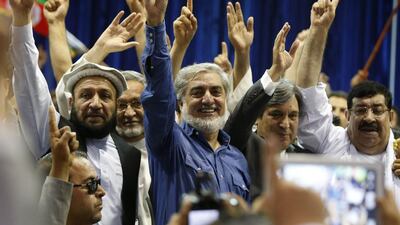KABUL // Afghan presidential candidate Abdullah Abdullah yesterday defiantly claimed victory in the election, despite preliminary results showing his opponent won more votes.
Meanwhile, violence escalated around the country, with a suicide bomber striking Afghan and foreign forces near a clinic in eastern Parwan province, killing at least 16 people, including four Czech soldiers.
Mr Abdullah said he had received calls from US president Barack Obama and secretary of state John Kerry, and was told Mr Kerry would fly toKabul on Friday to try to help defuse the crisis.
He told his supporters that the results of the election were fraudulent, but asked them to give him a few more days to negotiate.
“We denounce and do not accept the results of the fraudulent vote,” Mr Abdullah said. “I assure you people of Afghanistan that I will sacrifice for you, but I will never accept a fraudulent government.
“We announce that only the government elected through clean votes will come to power.”
The Afghan Independent Election Commission released preliminary election results on Monday showing the former finance minister Ashraf Ghani was well in the lead for the presidency.
But it said no winner could be declared because millions of ballots were being audited for fraud.
Preliminary results from the June 14 run-off vote showed Mr Ghani had about 4.5 million votes, or 56 per cent, while Mr Abdullah had 3.5 million votes, or 44 per cent. Turnout was more than 50 per cent.
That was a sharp turnaround from the first round of voting on April 5 when Mr Abdullah won the most votes, with 46 per cent to Mr Ghani’s 31.6, but failed to get the majority needed to avoid a run-off vote.
Mr Abdullah has refused to accept any results from the second round until all fraudulent ballots are invalidated.
Mr Ghani, also a former World Bank official educated in the US, said he also had spoken to Mr Kerry.
“We welcome him coming here, but the real responsibility is up to us and we are hopeful that we will fulfil all our responsibilities,” he said.
“We are prepared to engage in political discussion to make sure that we move to ensure the legitimacy of the process, its fairness and the acceptance of its results.”
He also rejected the idea of parallel governments, which has been raised by some supporters of Mr Abdullah.
“Talk of parallel governments will remain in the level of talk, because the historic responsibility that his excellency Dr Abdullah and I as people who have submitted ourselves to the will of the people of Afghanistan have is to ensure the stability of this country and the legitimacy of the regime to which we have devoted our lives.”
The election commission acknowledged that vote rigging had occurred and said ballots from about 7,000 more of the nearly 23,000 polling stations would be audited.
Mr Abdullah said departing president Hamid Karzai, Mr Ghani and the election commission were colluding against him.
“They ignored us and announced the fraudulent results,” he said.
There were fears that Mr Abdullah could ignore the result and declare victory, something he hinted at during his speech.
“People across the country call on us to announce our government and I can’t say no to people’s wish,” he said. “We don’t want civil war, we don’t want crisis. All of our lives we defended this country.
“We do not want crisis, we want national unity. We are the winner of the election without any doubt.”
Mr Kerry said any action to seize power illegally in Afghanistan would lead to the end of US financial and security support.
He said suggestions of a “parallel government” in Afghanistan were a grave concern and added that he expected Afghan electoral institutions to conduct a full review of all reasonable allegations.
Mr Kerry said there was no justification for violence or threats of illegal action.
“Any action to take power by extra-legal means will cost Afghanistan the financial and security support of the United States and the international community,” he said.
Mr Abdullah said Mr Obama had called him to promise help “in cleaning up votes”.
Meanwhile, the Czech ministry of defence confirmed four Czech troops were killed and another was badly wounded by yesterday’s blast.
At least 10 civilians and two police officers also were killed in the attack near the provincial capital of Charakar, local government spokesman Wahid Sediqqi said.
The Taliban claimed responsibility for the attack.
Also yesterday, the Philippines urged 4,000 workers in Afghanistan to leave the country during the election stand-off.
* Associated Press and Agence France-Presse

